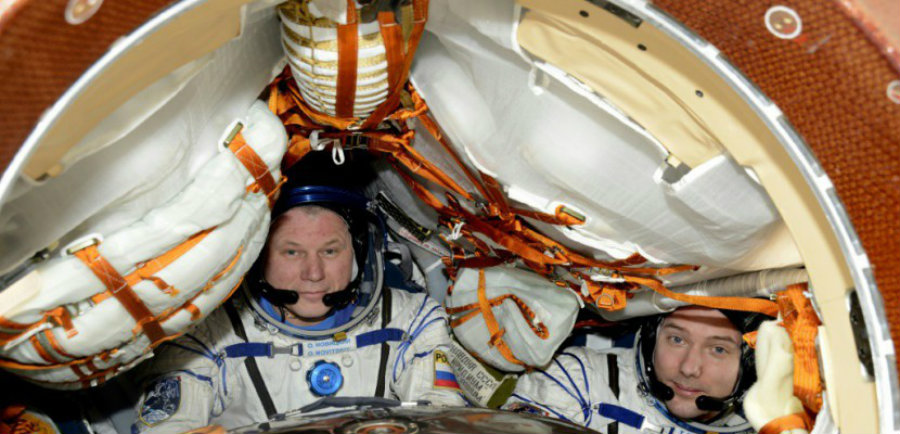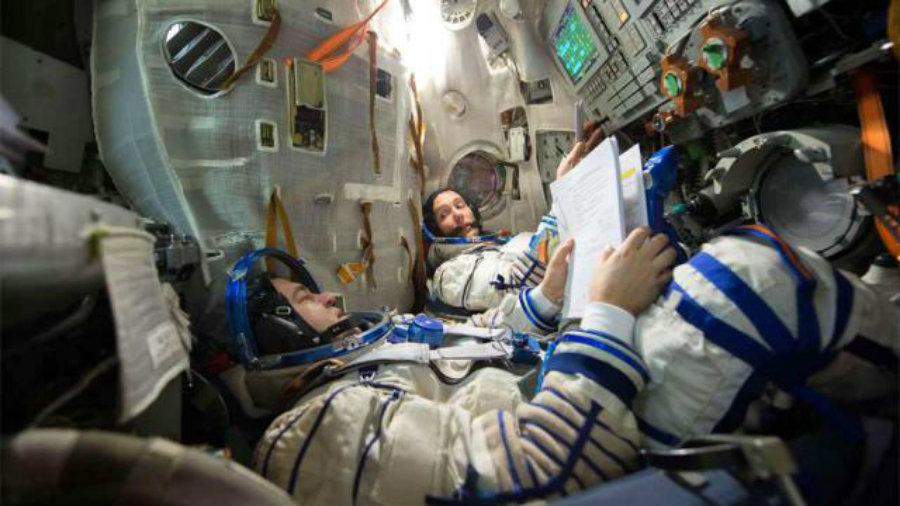Two astronauts from the International Space Station (ISS) returned to Earth on Friday. French astronaut Thomas Pesquet and Russian cosmonaut Oleg Novitski departed the ISS in a Soyuz MS-03 spacecraft, and landed on the Kazakh steppe, ending their marathon 196-day mission to the ISS.
NASA TV showed recovery crew helping them out of the spacecraft and carrying them away from the landing site. Pesquet and Novitsky were launched to the ISS on Nov 17, 2016, along with NASA astronaut Peggy Whitson, who is scheduled to stay on the ISS until September, when she’ll return with Russian cosmonaut Fyodor Yurchikhin and NASA astronaut Jack Fischer.

Pesquet and Novitsky returned home after spending six months aboard the ISS
The departing astronauts undocked as the ISS orbited above the Chinese-Mongolian border, marking the start of a 400 kilometer (250 miles) descent back to Earth scheduled to last over three hours.
A spokesman for Russian mission control told AFP that everything was well and that the landing had taken place at 8:10 pm local time (1410 GMT)
“All the operations for the descent from orbit and landing went to plan. The crew members feel well after returning to Earth,” said mission control in a statement, according to Phys.org.
This was Pesquet’s first trip to the ISS, and almost defeated the record of a space mission for a European Space Agency astronaut, which was set by Samantha Cristoforetti of Italy in 2015. The 39-year-old French astronaut tweeted a couple of hours before the undocking that it had been a fantastic adventure and an amazing ride. Former Russia Air Force pilot Oleg Novitsky completed his second mission to the ISS.

Pesquet warned about the ‘fragility’ of Earth
After the landing, the President of France, Emmanuel Macron, called Pesquet and told him “bravo to you,” while the astronaut told him that everything was going well, that he was just getting used to gravity. He told Macron that even just holding the telephone was difficult.
Although Pesquet spent over six months orbiting in the ISS, he was able to vote in the French elections from the space station and is set to meet Macron once he completes post-mission reports and work at the European Space Agency astronaut center in Cologne.
Pesquet won over the recognition of thousands of people at home and abroad and added over half a million followers on Twitter over the course of his departure preparation and time in space.
“We saw that he is very qualified, a real professional… with a great desire to work in space,” said Yuri Malenchenko, a retired cosmonaut who worked alongside Pesquet in Russia’s Star City, where both astronauts and cosmonauts prepare for their missions, according to AFP. “These qualities were confirmed during the flight.”
Jean-Yves Le Gall, head of CNES, the French space agency, told AFP that Pesquet had worked in a remarkable fashion. The French astronaut underlined the “fragility” of Earth during an interview with AFP, which he conducted from the ISS.
At the interview, Pesquet noted that there are things one understands intellectually, but which one doesn’t really get. He discussed global warming and said that they talk of two degrees (Celsius) or four degrees and that these numbers often exceed human understanding.
“But to see the planet as a whole… to see it for yourself… this allows you to truly appreciate the fragility,” said Pesquet, according to Phys.org.
NASA astronaut Whitson was left behind and will return to Earth on September
The record for the longest continuous space mission by a European Space Agency astronaut is still held by Cristoforetti, who orbited Earth for 199 days from November 2014 to June 2015, and who also broke the record for the longest single mission for a woman.
However, the record stays short from the 437-day mission by Russian cosmonaut Valery Polyakov, who stayed aboard the Soviet-Russian space station Mir from January 1994 to March 1995.
The $100 billion ISS space laboratory has been orbiting Earth since 1998, at about 28,000 kilometers per hour (17,000 miles per hour).
Pesquet and Novitsky were part of Expedition 51, along with Whitson. The crew became quite acquainted with each other and even celebrated Pesquet’s birthday aboard the ISS. Whitson was supposed to come back to Earth with the pair, but due to downsizing from Roscosmos -the Russian space agency- she was commanded to stay behind until September.
Roscosmos is temporarily reducing the number of cosmonauts it sends to the ISS from three to two. Whitson did not appear to take the news badly, and in a statement from April, she said she loved being up there, and that living and working aboard the ISS is where she feels she makes the greatest contribution. She added that having three more months to work on the space station is just what she wished for.
Source: Phys.org
